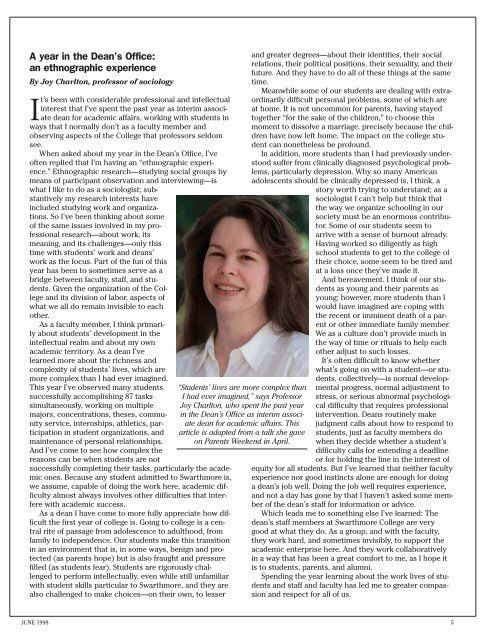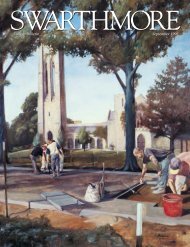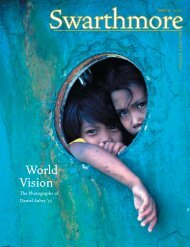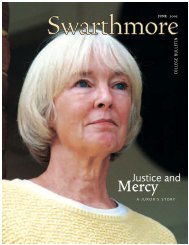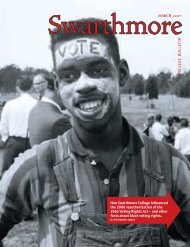Swarthmore College Bulletin (June 1998) - ITS
Swarthmore College Bulletin (June 1998) - ITS
Swarthmore College Bulletin (June 1998) - ITS
- No tags were found...
Create successful ePaper yourself
Turn your PDF publications into a flip-book with our unique Google optimized e-Paper software.
A year in the Dean's Office:an ethnographic experienceBy Joy Charlton, professor of sociologyIt’s been with considerable professional and intellectualinterest that I’ve spent the past year as interim associatedean for academic affairs, working with students inways that I normally don’t as a faculty member andobserving aspects of the <strong>College</strong> that professors seldomsee.When asked about my year in the Dean’s Office, I’veoften replied that I’m having an “ethnographic experience.”Ethnographic research—studying social groups bymeans of participant observation and interviewing—iswhat I like to do as a sociologist; substantivelymy research interests haveincluded studying work and organizations.So I’ve been thinking about someof the same issues involved in my professionalresearch—about work, itsmeaning, and its challenges—only thistime with students’ work and deans’work as the focus. Part of the fun of thisyear has been to sometimes serve as abridge between faculty, staff, and students.Given the organization of the <strong>College</strong>and its division of labor, aspects ofwhat we all do remain invisible to eachother.As a faculty member, I think primarilyabout students’ development in theintellectual realm and about my ownacademic territory. As a dean I’velearned more about the richness andcomplexity of students’ lives, which aremore complex than I had ever imagined.This year I’ve observed many studentssuccessfully accomplishing 87 taskssimultaneously, working on multiplemajors, concentrations, theses, communityservice, internships, athletics, participationin student organizations, andmaintenance of personal relationships.And I’ve come to see how complex thereasons can be when students are notsuccessfully completing their tasks, particularly the academicones. Because any student admitted to <strong>Swarthmore</strong> is,we assume, capable of doing the work here, academic difficultyalmost always involves other difficulties that interferewith academic success.As a dean I have come to more fully appreciate how difficultthe first year of college is. Going to college is a centralrite of passage from adolescence to adulthood, fromfamily to independence. Our students make this transitionin an environment that is, in some ways, benign and protected(as parents hope) but is also fraught and pressurefilled (as students fear). Students are rigorously challengedto perform intellectually, even while still unfamiliarwith student skills particular to <strong>Swarthmore</strong>, and they arealso challenged to make choices—on their own, to lesser“Students’ lives are more complex thanI had ever imagined,” says ProfessorJoy Charlton, who spent the past yearin the Dean’s Office as interim associatedean for academic affairs. Thisarticle is adapted from a talk she gaveon Parents Weekend in April.and greater degrees—about their identities, their socialrelations, their political positions, their sexuality, and theirfuture. And they have to do all of these things at the sametime.Meanwhile some of our students are dealing with extraordinarilydifficult personal problems, some of which areat home. It is not uncommon for parents, having stayedtogether “for the sake of the children,” to choose thismoment to dissolve a marriage, precisely because the childrenhave now left home. The impact on the college studentcan nonetheless be profound.In addition, more students than I had previously understoodsuffer from clinically diagnosed psychological problems,particularly depression. Why so many Americanadolescents should be clinically depressed is, I think, astory worth trying to understand; as asociologist I can’t help but think thatthe way we organize schooling in oursociety must be an enormous contributor.Some of our students seem toarrive with a sense of burnout already.Having worked so diligently as highschool students to get to the college oftheir choice, some seem to be tired andat a loss once they’ve made it.And bereavement. I think of our studentsas young and their parents asyoung; however, more students than Iwould have imagined are coping withthe recent or imminent death of a parentor other immediate family member.We as a culture don’t provide much inthe way of time or rituals to help eachother adjust to such losses.It’s often difficult to know whetherwhat’s going on with a student—or students,collectively—is normal developmentalprogress, normal adjustment tostress, or serious abnormal psychologicaldifficulty that requires professionalintervention. Deans routinely makejudgment calls about how to respond tostudents, just as faculty members dowhen they decide whether a student’sdifficulty calls for extending a deadlineor for holding the line in the interest ofequity for all students. But I’ve learned that neither facultyexperience nor good instincts alone are enough for doinga dean’s job well. Doing the job well requires experience,and not a day has gone by that I haven’t asked some memberof the dean’s staff for information or advice.Which leads me to something else I’ve learned: Thedean’s staff members at <strong>Swarthmore</strong> <strong>College</strong> are verygood at what they do. As a group, and with the faculty,they work hard, and sometimes invisibly, to support theacademic enterprise here. And they work collaborativelyin a way that has been a great comfort to me, as I hope itis to students, parents, and alumni.Spending the year learning about the work lives of studentsand staff and faculty has led me to greater compassionand respect for all of us.JUNE <strong>1998</strong> 5


